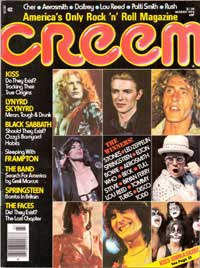Pebbles & Bam-Bam In Alphaville
By Rick Johnson, Creem, March 1976, transcribed by Dave Ward

The first thing you notice about Rush, according to one observer, is that they are not as gross-looking as Bachman-Turner Overdrive and they have a somewhat lower thud weight than most other Canadian bands. True enough-Canuck rockers do seem to have some sort of an uglier-than-thou competition going among themselves along with a tendency to pounce on unsuspecting ears like a carnivorous dumptruck.
But Rush isn't exactly a bunch of Joni Mitchell cupcakes either as anyone who's caught one of their numerous appearances with Kiss or increasing number of headlining gigs can attest to.
Mistaken assumptions and bent comparisons have confounded the band from the very beginning. "We've been compared to everybody from the New York Dolls to Led Zeppelin and Humble Pie, but all those comparisons are just superficial," asserts vocalist Geddy Lee, who along with guitarist Alex Lifeson and drummer Neil Peart make up one of the few remaining classic power trios. "Like, Robert Plant and I both have high voices so they expect us to play 'Whole Lotta Love.'"
"It's not like we're suffering from The Dreaded Led Zep Stigma," explains Neil in his best imitation of a foot-odor commercial. "We're essentially pursuing the same idea as them-playing rock & roll but saying something too." Two mints in one.
It indeed would appear that Rush, who are the number two group in Canada after the late BTO and very big as well in the northern half of this country, aren't just after terrorist audiences playing frisbee with plastic explosives and taking hostages at random. "We get frustrated when they're just out for a good time and we're not getting through," Neil complains. "Our favorite audiences are the ones that sit and listen to the song and go wild afterwards."
Seeing the band's main thrust as rezoning the elusive progressive artisms of bands like Yes and Genesis for a three-piece formula, he doesn't think that heavy metal as a strict jungle doctrine will be staying around much longer. "It was great for a while, but no type of music can stay in that embryonic stage for long. I mean, why just do teenage my-period-is-late tunes when you can put some meaning behind it? We like to tell stories and hide things in our songs for people to figure out."
Their latest project is an epic science fiction slab called 2112, which will take up an entire side of their next album, due this month. Set in the city of Megadon on another planet (Earth having been snuffed in 2062) in the cartoon light of the future, it concerns a society where everything is controlled by quasi-religious Priests who take all their orders from gigantic banks of computers called Temples. All individuality and creativity have been stamped out and everyone treadmills out their lives in a cathode palsy of day-to-day nullness.
"The Temples totally control everything-work, education. even entertainment," says Neil, who came up with the entire conceptual whoopee cushion and wrote all the Iyrics. "All their music has been taken to the final limits of the average. It's total commercialism that's put out strictly for people to like."
Luckily enough for the Megadunces, a curious young punk accidentally stumbles upon the ruins of a great university one day. He starts digging around in the rubble and comes across a room of perfectly preserved artifacts he's never seen before. Books, magazines, WIN buttons, hula hoops, records, the home version of Match Game '84-all kinds of things that don't exist in 2112. He keeps it a secret and goes back every night to sort through the cheese of the past.
Then one night he makes the fateful discovery-an electric guitar-and eventually sets out to change the world. What finally happens is a "double surprise ending" according to Neil, who declined to fill in the details but assured me it's "a real Hitchcock killer."
Does he see the city of Megadon as a parallel of the tedious fear-fridge of 1976? "Well, things aren't all that bad now, but it's a logical progression from some of the things that are going on. All of the best science fiction is a warning. We want to let people know what's going on so they at least have a chance to change it."
But does he really think they can change anyone? After all, the "Eve Of Destruction" school of pop propaganda sounded OK on the radio but didn't exactly alter the course of Western civilization. "Well, it's not going to change anybody's life or anything, but if you just put the germ of an idea in someone's head, then you've done your job."
Grim-globed hippies of the future or not, Rush's music is still very loudly in the present. Unlike some concept pieces that get bogged down in their own stray dogma, 2112 is still going to come under the Rush stage hammer on their next tour.
"Believe me, we'd never shortchange the music for lyrics," promised Geddy. "It still rocks." And Pebbles and Bam-Bam too, no doubt.